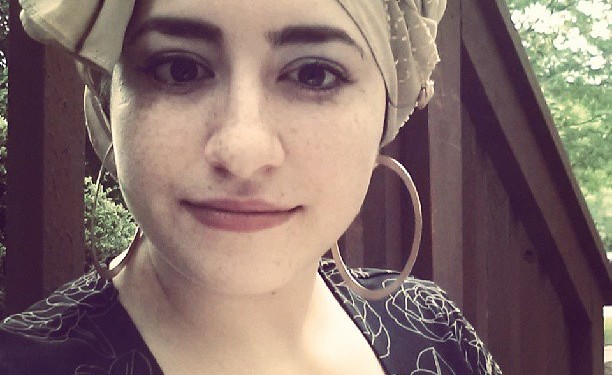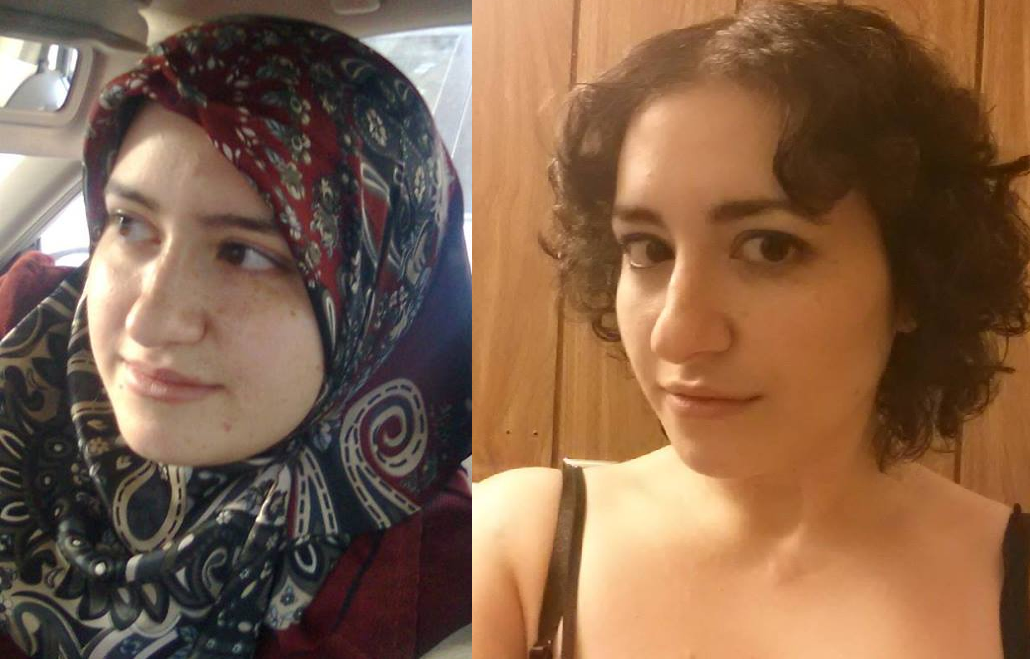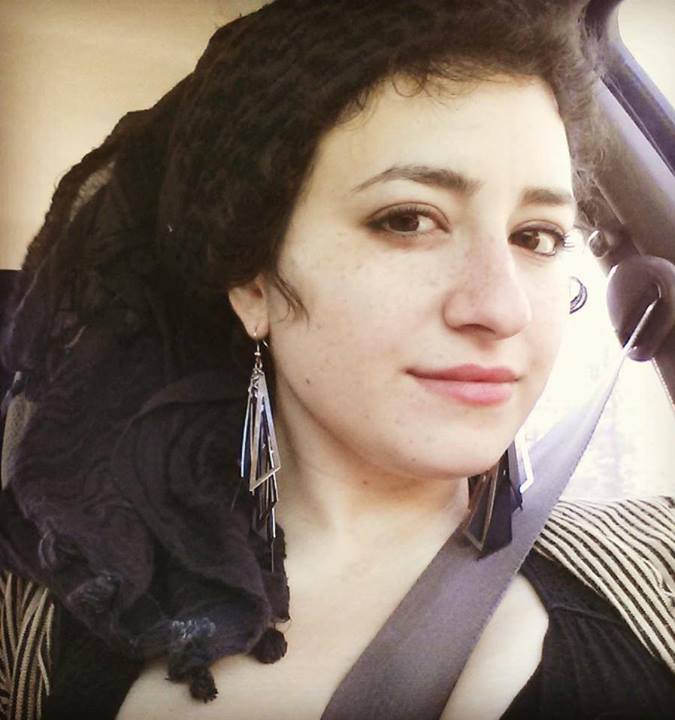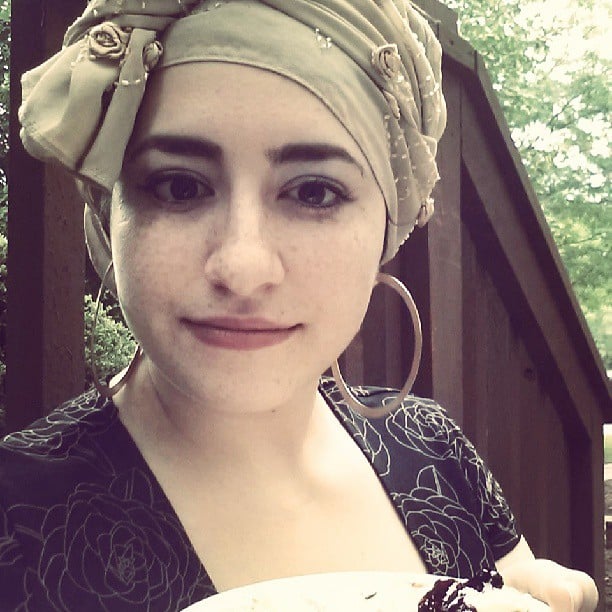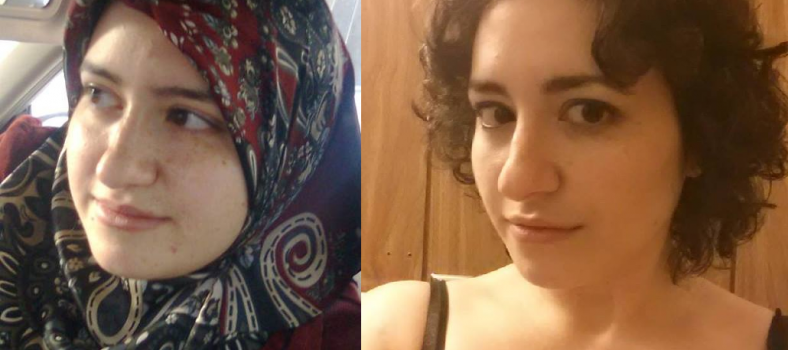What it is like to be an Ex-Muslim woman
Life and love post-hijab…
…wherein also I reveal a bunch of my faces
[Content Note: Body image, dissociation, mental illness, also small spoiler from Disney’s Frozen]
More from the ‘what it’s like to be a…’ series here, here, and here.
Some nights, I wish for remnants of that old Muslim self who governed her body with unwavering direction, powerful in her command of the movements of her hands, her legs, her body, teaching herself how to play a perfect role, to stay observably in line no matter what injustices rattled her insides. To keep form, to protect herself. She had undeniable discipline, believably forcing her body through rituals and routines repugnant to her spirit but necessary for her survival.
I thought, when I moved to the United States, that this discipline would redeem me, this ability for incredible control cultivated through years of mistakes and violent punishment and learning, that it would help me build a new life of strength, fortitude. I did not expect to discover that this incredible control I had over my expressions, my movements, my very line of vision was as fragile as it seemed strong, dissipating almost immediately when there was no longer need to suppress myself. I let my body go, in many ways. In giving myself an inch to feel, make moves, to feel, to try out new experiences, to feel, to touch, to taste, to run, to feel— I took ten thousand miles: of the wind, the rain, the sun that I drank into all the parts of my skin.
Have you seen Frozen? This 25 year old academic with a master’s degree cried watching Queen Elsa let loose and make an ice fortress on a mountaintop, reveling in the power and magic and splendor of a body newly freed from a lifetime of isolation and suppression, a lifetime of having to control and limit that body and the feelings that moved it, to negate her own self only because others thought her body was too dangerous and threatening to be free.
Who would have thought a Disney movie could perfectly encapsulate what it is like to be a Muslim woman who escapes the suppression and bodily control of the hijab and its behavior codes?
A woman who must then learn anew how to understand, direct, and connect with her body in healthy and healing ways. Ah.
I’ve written so much about the experiences and challenges I’ve faced growing up in a conservative Muslim society in the Middle East—the repression, the bodily control, the lack of privacy or self-determination, the dehumanization, the physical abuse, the kidnapping, imprisonment, all of it. In doing so I’ve only touched upon and hinted at what it can be like to try to build a life after all of this, after a lifetime of this—to salvage a sense of self, a wholeness of being, to pick up the pieces of this person bound up so tight that she has cracked and splintered in a thousand and one places—
and I decided to try to write about it tonight. Tonight has been another night of this struggle, one of what I term my “badbrains” days, shrouded in blurriness of spirit and an unsettling disconnect from this body that was, in my years of Islam, perpetually hidden as an object, made invisible, whose worth was thoroughly negated time and again.
It is true that I now own my body in ways I always should have had and was never given the right to. It is true that I’ve had some time and space to adjust—I’ve been in the US for about a year and a half now, and am surrounded by supportive and loving people, people of great wisdom and understanding. But still, I find that these challenges of self-making take up most of my thought and energy, and have led me to make drastic life changes, including quitting my job teaching college to attempt to make a living doing freelance work in the safety and flexibility of my own home instead, just to safeguard my health from the stress of academia. This struggle is borne too, I think, by many people who for a plethora of reasons feel hostile in their own bodies, but I’ve noticed that it is one that many of my Ex-Muslim sisters contend with post-Islam, and can trace its effects to the smothering influence of bodily regulation inherent in many Muslim codes of living.
There is hardly a time in my memory when my body has not been shrouded in the loose, flowing clothing of the conservative form of hijab espoused by my culture. I started wearing it when I was a child of 8, and wore it for fifteen years. I’ve written about this before, but inherent in wearing the hijab in my family’s from of Islam was a behavioral code of modest bodily interaction and conduct, even at home, that hypersexualized and shamed my body and at the same time suppressed and made my body invisible, all beyond the obscuring nature of the wide, loose clothing. I never learned to think of my body as perceivable, my own thing that I could love and take pride in, whose appearance and style I could control and create for myself; ever it was meant to be hidden away, unadorned, insignificant, unnoticeable, worthy only for the restricted use of others.
And now, I’m consistently hyperaware of it.
I obsessively adjust my clothes and touch my hair and skin in public, certain that there is something terribly amiss with these ways in which I am presenting my body. I watch everyone around me very closely, and notice that, even with the body-shaming misogyny that structures many American cultures, nobody does the same obsessive self-checking with anything resembling comparable frequency. I recognize that I am still out of touch with the reality of being an actually visible human subject, one who interacts and can interact with others. I have never dressed my body to be visible and have rather tried my best to obscure it with cloth. Beginning to play dress-up as an adult, it is hard for me to assess whether I’m wearing something incredibly trashy and ugh or just showing a normal amount of skin. I feel like everyone can see through my obvious discomfort with my body and my ignorance regarding how to dress it.
And it does feel like playing dress-up, without even the redeeming quality of being a curious, exploring child reveling in discoveries and choosing what she wants for herself. It is hard to feel like a person; I feel like I am aping, like a literal ape playing dress up, like there is some weird human secret to choosing clothes and learning how to do my hair and put on makeup and how does nailpolish work? and the whole experience of learning these processes that twelve year olds can run cycles through in their bedrooms with their similarly not-adept girlfriends. I feel like the best I can muster is a crude imitation—although I have developed tastes and opinions, and on some level believe they reflect some part of my self—I love bright colors and curling, fluttering patterns and vintage styles and cute, quirky shoes, shoes, shoes, and smoky eye makeup and plum lipstick shades and feel like green, blue and purple bring out the creaminess of my Mediterranean skin
—yet even in writing these words a deeper, hesitant part of me wonders if all of these opinions are a joke, a sign of me desperately trying to be normal and at the same time trying to figure out what my own style is, because these opinions seem to change with the seasons, and I am so inexperienced and so young, and none of it feels like it belongs with this body that I haven’t even fully understood how to claim as my own.
Some days, I am incredibly self-conscious of my hair—so foreign in its curly, puffy unruliness but also thinning and torn-up from gods-know what combination of hair-pulling and bad water and genetics and binding under scarves. On those days I feel like I cannot stand to have it seen, and I tie it up in a scarf—the same scarves I used as hijabs for years—and carefully arrange the ripples and folds of it, and walk out of this house. And it is not my head, my hair, it is not me—it is a sad, broken creature who keeps playing at emulating the concerns of those who have always had the privilege of connecting to and choosing their bodily appearance, because she can neither manage her own comfortable style nor the “normal” clothes (what my partner Jame ironically dubs “white girl clothes”) in this place where slim, hipster-y white bodies are normalized, where her curves are beacons of both shame and orientalist desire—ah.
These are familiar issues, I think, to what many women face for having their bodies torn down, shamed, and dehumanized. Women of color, women with eating disorders, women whose bodies have been mistreated in a plethora of ways, women whose bodies have been denied as the bodies of women—and they do not boil down to an antsy inability to feel comfortable in a certain style, with certain clothes—it’s not about belts and hats and colors and skirts. It’s about an inability to feel whole or connected to your body, the very vessel that is not a separate thing but that really is you.
And to be clear, this description is one of self-perception, a disconnect between my sense of self and my body and my ability to connect myself to other people—I full well recognize that to most of those around me, my discomfort and strangeness and ineptitude are often nearly imperceptible, and are only magnified as broken parts in my own mind. I have the good fortune to be what is considered conventionally attractive, gender-conforming, and cisgendered. While I am not thin, I have an hourglass figure and secondary sexual characteristics that are not only socially accepted but applauded. I am also pale enough to be able to sometimes pass as white.
All of these things are matters of privilege that make it so that my actual social interactions are very probably more often than not absolutely conforming, even if people can instinctively sense an underlying strangeness that makes them pause. It is also possible to learn behaviors, of course, and I have learned to go through the motions of the behaviors that make passing possible. But the problem is not one ofa functioning exterior, but of a broken interior, a struggle to hold parts of myself together in a cohesive, internally functioning way. It is a problem born of over two decades of dehumanization and tearing down, and the willpower and discipline that my former Muslim self once had in keeping herself in good form is now clear to me a symptom of brokenness, nothing more than swaying willingly into puppeteer strings, an inevitable circumstance of mere existence, and not a healthy build-up of fortitude or strength. It hardly allows me to hold up a veneer over my shattered parts.
It took some time to learn so much about myself. When I first moved to the US, I was almost giddy in trying out new tastes and smells and touches and experiencing a world of things ever-forbidden, always demonized, glorying in my ability to say and do and be and touch and want and love. It took a while for me to learn moderation, control, and I made many mistakes. But the numbing thrills of newfound freedom could not sustain me for very long, and soon my body began to finally let itself feel the damage of years and years of isolation and control. I developed PTSD, my always-cycling depression came back with renewed strength, and I began to regularly fight nightmares, paranoia, and delusions. I live a very quiet, almost hermited life now, leaving my house very rarely, finding it difficult to make and sustain meaningful connections, trying to find a place of healing and wholeness within myself before going back to expanding my repertoire of external experiences with greater care and more wisdom.
Sometimes I go to social events with colleagues and friends, but still I carry with me this fundamental discomfort with the fact that I even have a visible body and I don’t even know what to fucking do with all these parts of it. I still often feel that I am not a person, and I am only imitating things that people do and the ways they move. Before I quit my teaching job six weeks ago, the dissociation was incredibly strong, because I’d be basically be standing in front a room of cynical undergrads, most of them teenagers still, for an hour at a time with 20-odd pairs of eyes on me and imagine that they could see right through me and the scorn I felt myself to be receiving totally undermined my authoritative confidence. And I love teaching; it broke my heart to quit for health reasons. I work from home now, fortunate enough to have skills in demand for freelance work, and to be able to translate and transcribe interesting and compelling research on all sorts of philosophical and literary topics. I also get plenty of loving, human interaction with my partner, who I live with. I goto therapy every week, as well, fortunate enough to have accessible healthcare available to me, and I am healing. I am growing. But I wonder how many other people surviving extreme trauma and dehumanization do not have the ability to create their own flexible working environment on their own time (are they even fortunate enough to secure a job with fixed hours?) and access to healthcare. I have online conversations with members of my Ex-Muslim community and their struggles are resonant, palpable—struggles with living a double life, bearing the stigma of apostasy, building renewed lives post-religious suppression and trauma. Just tonight we had a long thread talking about our bodies and the ways they have been suppressed and controlled, and the dissociation that stems from it.
The dissociation is not only a personal bodily one; it is one of self-to-self interaction, stemming also from a lifetime of control regarding intimate and friendly interactions with others, especially those of the opposite sex. Shaming, punishment, extreme restriction. Because I am queer, this starvation of social interaction has extended to how I perceive my ability to interact with women as well, and there is hardly a time when I’m in public attempting to conduct conversations that involve understandings of social mores and acceptable boundaries when I’m not riddled with extreme anxiety and perpetually afraid that there is some deep flaw of personhood that everyone can see, as plain as an ink blotch onmy face and that everyone politely ignores. It runs so deep that I feel myself at a loss to find common ground with those around me—the issues my mind is caught up with—issues of suffering, oppression, control, abuse, survival, creating ten thousand rules and fidgets and systems and mechanisms for myself in order to keep myself treading water above the clinging darkness of depression and PTSD, mental illness and nightmares and paranoia—
—and I look up at the wedge of lemon glinting in someone’s Long Island ice tea as they casually discuss the material they are interested in teaching the next semester. How can such a sea of concern be bridged? How can such self-absorption with one’s own pain and the lingering tastes of a trudging, worm-like life be overcome in such a moment, to open your lips and give a coherent opinion on poetics, to make eye contact and be more than an empty self as you try to acknowledge the personhood of this smart, sensible, empathetic human being staring at this body of yours that you feel you are barely tethered to, floating away, away, away from…
hold on.
-Marwa
PS: Every small bit of support helps me continue to produce this work. Hit the Donate button and/or share my blog on your social media platforms! Thank you.

